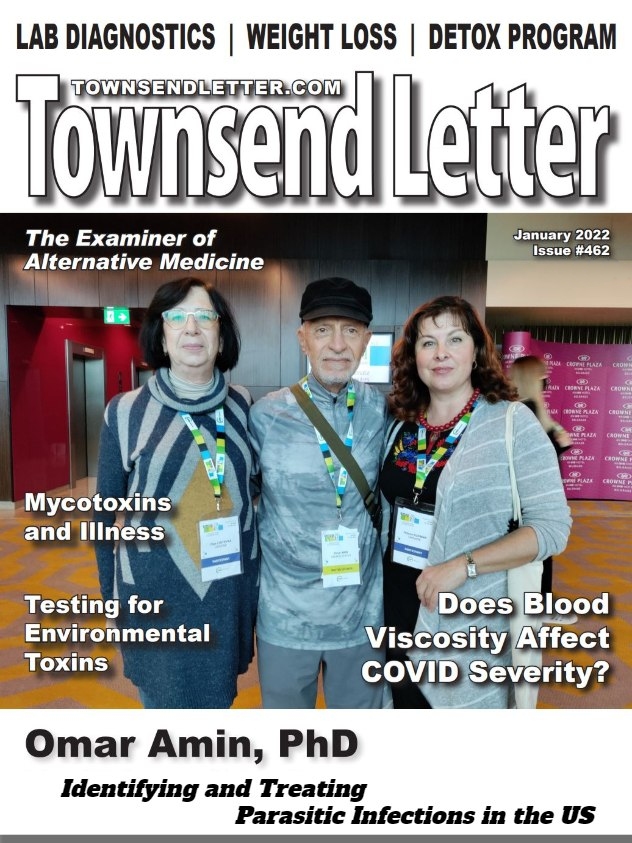How Effective Is Ivermectin for COVID-19?
On these pages and online we have published articles about preventing and treating COVID-19 with ivermectin (see the protocol in this issue by M. Gonzalez, M. Berdiel, L. Martinez, J. Massari, M. Carrascal, S. Nunez, J. Rodriguez, J. Leon, and R. Diaz.) Ivermectin is well established as an anti-parasitic medication employed in the treatment for river blindness in Africa as well as scabies in the US. It has also been established as an effective veterinarian treatment for parasites in horses and other animals. However, the FDA and WHO have not deemed ivermectin as suitable for prevention or treatment of the pandemic virus in humans (or animals). Nevertheless, many physicians have prescribed ivermectin for COVID-19 prevention and treatment basing their rationale on numerous studies that have been published over the past 1.5 years, including a positive study published in Nature that was ultimately retracted without the author’s permission.1
The literature of medical studies on ivermectin for SARS-CoV-2 is extensive and meta-analyses, including one recently published in QJM, have found the evidence for ivermectin lacking or insufficient, although two meta-analyses came to the opposite conclusion.2 What is one to make of the conflicting information about ivermectin? With the widespread “anti-vax” attitude in the US where one-quarter to one-third of all individuals remain unvaccinated, including a great many of the patients in integrated and naturopathic practices, ivermectin remains a highly requested prescription especially by unvaccinated patients. More disturbing has been the use by individuals who have not sought medical care who acquire ivermectin through whatever source available online especially from pet supply stores using ivermectin medication for horses. Not a few individuals using such OTC medication have become ill requiring emergency care. The media and the late-night comedians have enjoyed poking fun at the schadenfreude of persons seeking to avoid become ill from COVID-19 instead finding themselves poisoned by horse ivermectin. Leaving aside the jokes does ivermectin truly work for COVID-19?
In the October 23 article published by The Atlantic titled “The Real Scandal About Ivermectin,” James Heathers, chief scientific officer of Cipher Skin, argues that the articles demonstrating effectiveness of ivermectin use are flawed, indeed, deeply flawed.3 Readers of the Townsend Letter are familiar with editorial and literature commentary by contributing medical editor, Dr. Alan Gaby, who has been concerned about shabby research conducted by many researchers in Iran.4 Gaby has noted frequent concerns with patient recruitment, data reporting, treatment protocol, medical evaluation, and enrollment dates. Heathers finds that these issues are not limited to Iranian researchers but are commonplace around the world and involve physicians and scientists at all levels of research. “A 2012 survey of researchers at five academic medical centers in Belgium reported that 1 percent admitted to having fabricated data in the prior three years, though 24 percent said they had observed a colleague doing so. A meta-analysis on the same topic concluded, similarly, that 2 percent of researchers admit to having engaged in serious misconduct while 14 percent say they have observed it in a colleague.”5 The fact that an article is published in a medical or scientific journal does not assure that the study was conducted properly and that the data is being reported accurately. Indeed, Heathers asks that we consider the research we are reading to be fraudulent and make the author(s) prove otherwise. So, what are we to make of the ivermectin studies claiming COVID-19 efficacy?
Heathers discusses the work he does in his Atlantic article which involves a voluntary group of reviewers who conduct “forensic peer review.” This is similar to the work that our editor, Dr. Gaby, has been doing assessing studies published in Iran. Heathers et al. dive deep examining study methodology, data reporting, statistical analysis, author bias, even text plagiarism. Heathers’ team examined 30 of the most important ivermectin studies that have either been randomized or have been most influential online. They communicated with the authors and the journals and, not infrequently, there has been heated and contentious discussion. A pre-print article in Research Square was withdrawn based on Heathers’ work.6 In that paper from Egypt the authors had an ivermectin group and control group where deaths from COVID-19 had been compared; the data of the control group included deaths that had occurred before the study even began! Interestingly, the lead author defended the paper despite the exposed fraud. Heathers reported that an Argentinian study reporting ivermectin success had recruited patients from local hospitals, yet when those hospitals were contacted they denied their involvement in the research. The authors then blamed statisticians for making this blatant deceit. In another study from Lebanon, Heathers’ team observed that the data was repeated in peculiar fashion throughout the paper as though it were “copied and pasted;” a contributing author agreed that the paper should be retracted although the journal did not retract it.
Is there any—any paper that has reported ivermectin effectiveness which has stood up to forensic peer review? Heathers and company state emphatically, “no!” The problem is that journals do not do forensic peer review and most race to have a pre-print appear online. We invite the readership to do their own forensic peer review and identify published studies that meet muster confirming ivermectin’s effectiveness.
Whistleblower Questions Integrity of Pfizer’s Vaccine Trial Data
While James Heather’s aforementioned forensic examination of published ivermectin papers found innumerable examples of methodological irregularities and data fraud, an informant, Brook Jackson, sounded the alarm about testing protocol violations she personally observed on-site during the Pfizer vaccine trial. Her concerns were detailed in an investigative report by Paul D. Thacker in the November 2 issue of the British Medical Journal.7 Jackson was not a recently trained temp employee but a veteran investigational trial oversight manager with 15 years’ experience. She observed falsification of data, unblinding of patients, hiring individuals inadequately trained in vaccination, and delay in reporting and follow-up of adverse events in the critical Phase 3 of the vaccine trial. Jackson saw trial staff who were overwhelmed with problems they were facing. Eventually Jackson emailed the FDA about her concerns; the company conducting the trial, Ventavia, fired her later that same day. She provided the BMJ internal reports, emails, photos and videos documenting the haphazard state of the Pfizer vaccine trial.
While Ventavia boasts on its website about its award-winning experience conducting clinical trials, Jackson’s oversight experience documented a trial mismanaged, riddled with inconsistent clinical practices, inadequate safety concerns for the patients, and outright data fraud. For a study that clearly required blinding, Jackson found vaccine materials with study participants’ numbers sitting on lab counters available for anyone to see; those drug assignment numbers were also found in the participants’ charts available for “blinded” clinical staff’s knowledge. The level of errors and quality control concerns was staggering, and Ventavia managerial staff were unable to keep up with them. Despite the requirements of ICON, the organization ultimately responsible for conducting the research, Ventavia did not comply with requirements to follow-up and document patient adverse events or complaints within 24 hours.
Of course, the slipshod behavior Jackson observed at the Texas Ventavia trial sites were given a pass by the lax oversight of the FDA. Due to inadequate funding the FDA does not have the staffing to conduct on-site inspections of drug trial facilities during the course of studies. Indeed, Ventavia executives were worried about an FDA audit during the Pfizer vaccine trial, but the FDA never showed up. It was the first time in Jackson’s research management career that she was fired. Although the FDA did contact her, there was no follow-up by the FDA to inspect Ventavia then or since. When the FDA advisory committee met on December 10, 2020, to review Pfizer’s documentation of the trial, there was no discussion about problems with Ventavia. Other former Ventavia employees did discuss their concerns with the BMJ, including one who stated that “she had never experienced such a ‘helter skelter’ work environment as with Ventavia on Pfizer’s trial.” Since the adult trial has ended, Pfizer has contracted with Ventavia to test four other vaccine trials including a trial for children, young adults, and pregnant women.
We all know now how the Pfizer vaccine trial worked out for children based on Ventavia data.
Hey! It’s Not COVID-19—It’s Acute Pneumonia!
Isn’t it interesting that the US with a population of 330 million has had 46.3 million COVID-19 cases with 752 thousand deaths, while the entire continent of Africa with a population of 1.3 billion has only had 8.6 million cases with 216 thousand deaths? We have just one-quarter of Africa’s population but five times the number of cases and more than three times the number of deaths. We are constantly reminded that our overall health system pales compared to a great many countries around the world, but how could it be that Africa is so much healthier dealing with the pandemic? You do get the picture, right? A continent where sanitation and water supply systems are fraught, droughts and famines ravage, wars and conflicts rage, malaria and parasites are rampant, yet, somehow, African countries avoid contagion and death. How can this be?
A report in the November 5th Wall Street Journal focused on one African nation, Tanzania, to understand its approach to COVID-19.8 It turns out that Tanzania’s deceased president decided last year that the virus was a satanic myth. Journalists and physicians were ordered not to refer to the disease as COVID-19, in an effort to keep society and businesses open. What this meant, of course, is that no cases or deaths were recorded: all were mislabeled as pneumonia, heart disease, or something else. Examination of graveyards and cemeteries present a very different picture. Sales of caskets had a dramatic increase over the past 18 months. In Tanzania, burials were frequently conducted secretly at night. It has a population of nearly 60 million but only 724 COVID deaths; between May, 2020 and June 2021 there was zero cases or deaths.
Deceased president John Magufuli called the disease satanic but offered only non-medical treatments. He forbade importation of vaccines calling them dangerous. Magufuli suggested steam baths as the best treatment to sweat away the virus. An herbal syrup was given the government’s imprimatur as a treatment. But Magufuli’s government staff began succumbing to COVID-19 earlier this year. Finally, Magufuli, himself, became ill eventually dying presumably of COVID-19, but his death was listed as heart failure.
Not only do medical researchers fabricate data but so do governments. Integrity and truth may now be the world’s most valuable and rare commodity.
Cover Article: Detecting Parasites by Omar Amin, PhD
North Americans do not face the same burden with parasites that denizens of Africa, South America, and Asia embrace. River blindness, elephantiasis, schistosomiasis, and malaria do not walk into the US practitioner’s office every day. Admittedly, we do see the occasional case of giardiasis and amebiasis, less frequently tapeworm and hookworm. The heating up of the continent is bringing Latin American mosquito-borne illness up north, and tick-borne bites are carrying additional pathogens. Still diagnosing parasites remains more of a backwater for physicians; we are too busy dealing with cancer, heart disease, depression, neurologic disorders, and orthopedic concerns. I was quite shocked years ago when my toddler son had a bowel movement accompanied by a long roundworm. Later scabies was a frequent concern for our children and their classmates during their school years. We do have a parasite problem in the US—it’s just not the exotic variety seen at the equator.
Omar Amin, PhD, has made it his life passion to diagnose these buggers. He was educated in Egypt but has spent his career here in Arizona at the Parasitology Center in Scottsdale. Amin has been the author of quite a few papers on parasites, including studies on Cyclospora cayetanensis, Blastocystis hominis, and Cryptosporidium parvum. Omar notes that every tissue in the body is subject to parasitic infestation and sources of the parasites include drinking water, running water, food, insects, air, pets, people, and soil. In 2017 Amin and his associate, Karim Amin, wrote about the incidence of parasites in Los Angeles: 41% of 3,883 stool specimens examined between 1996 and 2013 had parasites with a majority being B. hominis. This was a higher incidence than was noted in Amin’s 2002 study where a prevalence rate of 32% was noted in specimens studied throughout the US. Amin’s study finds that the prevalence of parasites is generally higher than what has been reported by state laboratories. Amin reminds us of the outbreak of Cryptosporidium parvum in Milwaukee in 1993 leading to 400,000 people becoming ill and 100 dying. The cause of the infection was linked to drinking water. As Amin points out, parasite infection risk is present everywhere and the opportunity for an individual to succumb to a parasite necessitates our need to bring its diagnosis out of the backwater and into day-to-day office work.
References
1. Zaidi A, Dehgani-Mobaraki P. Retracted Article: The mechanisms of action of ivermectin against SARS-CoV-2: An evidence-based clinical review article. The Journal of Antibiotics (Nature). June 15, 2021. https://doi.org/10.1038/s41429-021-00430-5
2. Deng J et al. Efficacy and safety of ivermectin for the treatment of COVID-19: a systematic review and meta-analysis. QJM. 2021; Sept. 27: hcab247. https://doi.org/10.1093/qjmed/hcab247
3. Heathers J. The real scandal about ivermectin. The Atlantic. Oct. 23, 2021.
4. Gaby A. Literature review & commentary: Curcumin and Coenzyme Q10 for migraine prophylaxis, or Iranian research fraud? Townsend Letter. 2021; 459: 10-15.
5. Fanelli D. How many scientists fabricate and falsify research? A systematic review and meta-analysis of survey data. PLOS One. May 29, 2009: 4(5): e5738. https://doi.org/10.1371/journal.pone.0005738
6. Pre-print. Efficacy and safety of ivermectin for treatment and prophylaxis of COVID-19 pandemic. Research Square. Retraction: July 14, 2021. doi: https://doi.org/10.21203/rs.3.rs-100956/v4
7. Thacker P. COVID-19: Researcher blows the whistle on data integrity issues in Pfizer’s vaccine’s trial. 2021, Nov. 2: 375 doi: https://doi.org/10.1136/bmj.n2635
8. Parkinson J. A COVID-19 coverup: secret burials, ‘acute pneumonia’. WSJ. Nov. 5, 2021.










